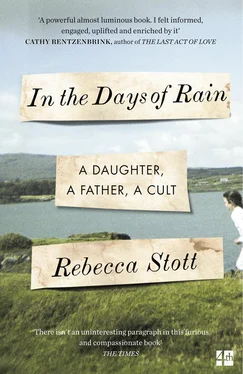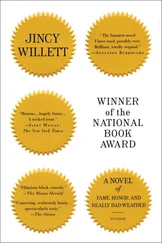My brother and I played Chopin in the late afternoon. At around five, the light began to fade. My stepmother and sister-in-law set out to drive the six miles across the fens to buy milk. The phone rang. I walked from my father’s chair through the nave of the Mill to the sitting room at the far end of the building to take the call. It was an old friend of my father’s asking how he was.
Across the fields in the half-light I could just make out something moving in the distance, a flash of white against the darkening trees. It was a barn owl, flying low through the dusk, following the path of the river, heading straight for the Mill, heading straight for us. I walked back down the long corridor to where my father lay breathing in rasps, my brother reading the newspaper beside him.
‘It’s coming,’ I said.
I have no idea what I thought the ‘It’ was. My brother put his newspaper down, I opened the window and we each picked up one of my father’s great gnarled hands, just as the owl passed by the front door, just as my father took his last breath, just as my stepmother opened the door with the milk, just as a great congregation of crows, lapwings and blackbirds took up their positions in rows along the electricity cables and pylons. The owl circled the house for twenty minutes and then disappeared.
Twilight on the equinox, with an owl, by a river. It was just as my father would have conjured it.
No one would have guessed that I’d been raised in a Christian fundamentalist cult, or that my father and grandfather were ministering brothers in one of the most reclusive and savage Protestant sects in British history. So it would always be my fault if the subject came up. It might be because I’d dropped my guard, got bored, or told a story from my childhood. Of course, once it did come up, it would always be difficult to make it go away again. People were interested; they asked questions. I’d never learned how to steer around the subject.
You can’t tell just bits of it, I’d remind myself. Once you get started the whole thing starts unravelling, like a stitch in a scarf, or a story that has no beginning, middle or end. Best not to start at all. Best to keep quiet.
No matter how many times I’d try to tell it, in pieces or at length, I’d always end up baffled, feeling as though there was a part I’d left out or forgotten, a lost moral or a punchline.
‘I was raised in a cult,’ I’d say, and then I’d recoil, embarrassed by the melodrama of the words I’d used. Were the Brethren a cult? I didn’t know. What was the difference between a sect and a cult? Was there a point on a spectrum where a sect became a cult?
‘We wore headscarves,’ I’d say. ‘We weren’t allowed to cut our hair. We weren’t allowed television, newspapers, radios, cinemas, holidays, pets, wristwatches.’
The list of prohibitions always seemed endless. I’d watch people’s eyes open wider. They’d look at me askance, then compete to ask questions, and I’d think, Oh no, not this again .
‘We weren’t allowed to talk to the other children at school,’ I’d say. ‘They told us that everyone outside the Brethren was part of Satan’s army and they were all out to get us. They called them “worldly”, or “worldlies”. If you didn’t do exactly what they said, they’d expel you. Then your family wouldn’t be allowed to speak to you ever again. People committed suicide. People went mad. Yes, this was Brighton. Yes, this was Brighton in the sixties. Yes, during flower power. In the suburbs. During the sexual revolution. Yes. It’s hard to explain.’
‘You were raised Plymouth Brethren ?’ people would say. They would have heard about the Plymouth Brethren. Some might even have read Father and Son , Edmund Gosse’s beautiful memoir about growing up in a nineteenth-century Plymouth Brethren assembly. And I’d hear myself reply with a hint of superiority, ‘We weren’t Plymouth Brethren. We were Exclusive Brethren.’
‘My people were the hardliners,’ I’d say. ‘Gosse was in the Open Brethren. That was nothing. They were virtually Baptist . They had pulpits and priests and adult baptisms. They were allowed to talk to worldly people, even eat with them.’
My people? Had I really just said ‘my people’?
But even if the subject didn’t come up, my Brethren childhood would rear up like Banquo’s ghost at the dinner table, refusing to be buried. At university, when I made new friends and confidantes, I couldn’t explain how I’d become a teenage mother, or shoplifted books for years, or why I was reckless, impatient, afraid of the dark, and had a compulsion to rescue people, without explaining the Brethren, the God they made for us, and the Rapture they told us was coming.
But then, I couldn’t really talk about the Brethren without explaining about my father, how he’d been a ministering brother and then become addicted to roulette when he left the sect and stopped believing in God. I’d have to explain how he’d gone to prison for embezzlement and fraud and then ended up making films for the BBC, and that on his deathbed he’d talked about a ‘Nazi decade’ and made us promise not to let anyone pray over his sleeping body.
And I could never really tell my father’s story without telling my grandfather’s – how the Scottish ships’ chandler had migrated south to supply food to the hotels of Brighton and had ended up one of the ruling members of the Brethren and running the publishing house that printed Brethren ministries.
And to explain Brethren women, I’d have to tell the story of how my great-grandmother had been sent to an asylum in Australia for forty years by her Brethren husband not just because she had epilepsy, but because she was considered too wilful . Wilfulness isn’t allowed in Brethren women, I’d say, and then I’d realise that I didn’t really know what kind of wilful she’d been.
My family, I’d tell them, have been caught up in the Brethren for a hundred years. And then I’d notice I’d just used that funny old-fashioned phrase my mother always used: caught up in .
‘But back then, of course,’ she’d say when she was remembering something about rationing or the air raids, ‘we were caught up in the Brethren.’
My family hadn’t belonged to the Brethren, we’d been caught up in them. Caught up like a coat catching on thorns. Caught up in a scandal. Caught up in the arms of the Lord. Whichever way you phrased it, it meant you didn’t get to choose, and that there was no getting away.
And then I’d be five years old again, sitting in Meeting, listening to my grandfather preaching about the Rapture. The Lord Jesus was going to take us with him up into the air in the middle of the night, he’d say. We’d be caught up in his arms. My grandfather’s usually harsh Scottish preaching voice would go soft when he talked about the Rapture. And I’d be sitting there swinging my legs on the chair in the Meeting Room, wondering how the Lord Jesus was going to lift all of us up at the same time – there were some large and sweaty people in our fellowship. The Lord Jesus would have to be a giant to be strong enough to lift my father off the ground. I’d never seen anyone do that.
After we left the cult my father sometimes tried to explain about the Brethren to people who’d never heard of them. Though he was a man who’d seize any opportunity to hold the floor, his eyes always seemed to glaze over when anyone asked him about it, as if he was bored or reading from a script. He complained that when he tried to write an Exclusive-Brethren-in-a-nutshell section in his memoir it just came out as a lump of gawky exposition. My mother refused to talk about it at all. Best to draw a line under all of that, she’d say. No use going back in there. It won’t do any good.
Читать дальше












